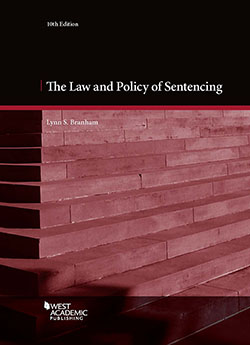- Home
- The Law and Policy of Sentencing
The Law and Policy of Sentencing
This softcover 10th Edition covers the law and policy of sentencing. Earlier editions of these books were combined in one hardcover book. They are now published in separate softcover volumes for the two discrete courses in which these subjects are now typically taught – Sentencing Law and Policy (Criminal Procedure III) and Correctional Law.
This leading casebook on sentencing law and policy includes cases, statutes, court rules, sentencing guidelines, professional standards, articles, information on other countries’ practices, and questions to provoke lively debates. The book spans such topics as plea bargaining, rights during sentencing, sentencing factors, community sentencing options, the death penalty, noncapital cases and the Eighth Amendment, parole release and revocation, and the enmeshed penalties (collateral consequences) that attend a conviction. New or expanded coverage of restorative justice and practices, racial and ethnic disparity in correctional supervision, criminal-justice-related fees, and other subjects accentuates this book’s value on a core area of the law.
Imprint: West Academic Publishing
Series: American Casebook Series
Publication Date: 04/11/2018
Lynn S. Branham, University of Missouri-Columbia School of Law
CasebookPlus™
This title is available in our CasebookPlus format. CasebookPlus provides support beyond your classroom lectures and materials by offering additional digital resources to you and your students. Anchored by faculty-authored formative self-assessments keyed to our most popular casebooks, CasebookPlus allows students to test their understanding of core concepts as they are learning them in class – on their own, outside of the classroom, with no extra work on your part. CasebookPlus combines three important elements:
- A new print or digital casebook
- Access to a downloadable eBook with the ability to highlight and add notes
- 12-month access to a digital Learning Library complete with:
- Chapter questions keyed to the casebook
- Black Letter Law questions (available in select subjects)
- Subject area review questions for end of semester use
Leading digital study aids, an outline starter, and audio lectures in select subjects
Students can still utilize CasebookPlus digital resources if they’ve purchased a used book or are renting their text by purchasing the Learning Library at westacademic.com.
With CasebookPlus, you can customize your students’ learning experience and monitor their performance. The quiz editor allows you to create your own custom quiz set, suppress specific quiz questions or quiz sets, and time-release quiz questions. Additionally, the flexible, customized reporting capability helps you evaluate your students’ understanding of the material and can also help your school demonstrate compliance with the new ABA Assessment and Learning Outcomes standards.
The tenth edition of this leading casebook on sentencing law and policy profiles many key developments since publication of the book’s last edition. The book also expands its coverage of a number of subjects. The updates and revisions in the book include, among others:
- An overview of restorative justice and practices in a Racial Justice Task Force’s report
- Researchers’ findings on factors contributing to racial and ethnic disparity in the persons subject to correctional supervision
- The inclusion as principal cases of three Supreme Court cases previously discussed in the notes: Padilla v. Kentucky (scope of a defense attorney’s constitutional duty to apprise a defendant of the deportation consequences of a guilty plea); Roberts v. United States (constitutionality of treating a defendant’s refusal to cooperate in the investigation of crimes committed by others as an aggravating sentencing factor); and Graham v. Sullivan (constitutionality of life sentences without parole imposed on people who were under eighteen when they committed a nonhomicide crime)
- The Supreme Court’s decision in Alleyne v. United States holding that there is a constitutional right to have a jury determine the existence of a fact that will trigger or increase a mandatory-minimum sentence
- The stance of the Model Penal Code: Sentencing on selected sentencing-related issues
- Two studies’ findings on the effects of requiring people convicted of crimes to pay fees to defray the costs of criminal-justice operations and correctional programs
- An article outlining options to eliminate the “correctional free lunch” under which states pay the full costs of imprisonment
- Justice Breyer’s dissenting opinion in Glossip v. Gross spotlighting what he considers three constitutional problems with the death penalty and Justice Scalia’s spirited response
- Augmented coverage of the “enmeshed penalties” (collateral consequences) of a criminal conviction, including steps being taken to limit their adverse impact
Learn more about this series.
Access Denied
Law School Faculty - Sign in or Create an Account to access this content. Law faculty who have created an account can sign in after receiving email notification that registration has been approved. Email accountmanager@westacademic.com or call 800-313-9378 for assistance.
Other Higher Education Faculty who wish to access digital review copies or teaching resources should contact their West Academic Account Manager at college@westacademic.com or 800-360-9378.
Adopters Only
This content is intended for adopters only. Sign in or Create an Account to access this content. Law faculty who have created an account can sign in after receiving email notification that registration has been approved. If you are an adopter who is unable to access this content after signing in, contact your account manager for assistance at accountmanager@westacademic.com or call 800-313-9378 for assistance.
Access Denied
Sign in or Create an Account to access this content. Faculty who have created an account can sign in after receiving email notification that registration has been approved. Contact us for assistance.
Law School Faculty: email accountmanager@westacademic.com or call 800-313-9378.
Other Higher Education Faculty: email college@westacademic.com or 800-360-9378.
Access Denied
Higher education faculty who wish to view this document should contact their West Academic Account Manager at college@westacademic.com or 800-360-9378.
